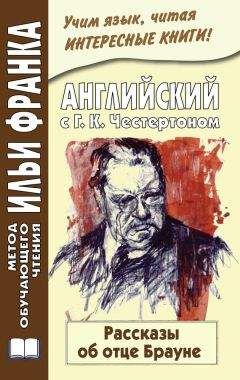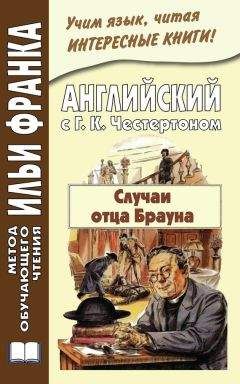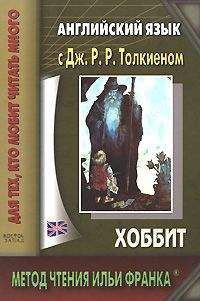“I can tell you,” said the priest promptly. “In the northeast corner of the cemetery of the Protestant Cathedral at Belfast.”
“Indeed?” inquired the other. “Have you looked for it?”
“I couldn’t,” replied Brown, with frank regret. “There’s a great marble monument on top of it; a monument to the heroic Major Murray, who fell fighting gloriously at the famous Battle of the Black River.”
Flambeau seemed suddenly galvanised into existence (казалось, Фламбо неожиданно оживился; to galvanise – электризовать; стимулировать; возбуждать; оживлять; existence – жизнь, бытие, существование). “You mean (вы хотите сказать),” he cried hoarsely (воскликнул он охрипшим голосом), “that General St. Clare hated Murray, and murdered him on the field of battle because (что генерал Сент-Клэр ненавидел Меррея и убил его на поле боя, потому что) – ”
“You are still full of good and pure thoughts (вы все еще полны добропорядочных и чистых мыслей),” said the other. “It was worse than that (все было хуже).”
“Well,” said the large man (сказал большой человек), “my stock of evil imagination is used up (запас моей дурной фантазии иссяк; stock – запас; ассортимент; evil – зло; вред; to use up – израсходовать, использовать; истратить).”
The priest seemed really doubtful where to begin, and at last he said again (священник, видимо, раздумывал, с чего начать, и, наконец, сказал снова):
“Where would a wise man hide a leaf (где умный человек прячет лист)? In the forest (в лесу).”
Flambeau seemed suddenly galvanised into existence. “You mean,” he cried hoarsely, “that General St. Clare hated Murray, and murdered him on the field of battle because – ”
“You are still full of good and pure thoughts,” said the other. “It was worse than that.”
“Well,” said the large man, “my stock of evil imagination is used up.”
The priest seemed really doubtful where to begin, and at last he said again:
“Where would a wise man hide a leaf? In the forest.”
The other did not answer (другой /человек/ не ответил).
“If there were no forest, he would make a forest (если бы леса не было, он бы посадил лес). And if he wished to hide a dead leaf, he would make a dead forest (если бы он хотел спрятать мертвый лист, он посадил бы мертвый лес).”
There was still no reply, and the priest added still more mildly and quietly (ответа опять не последовало, и священник добавил еще мягче и тише):
“And if a man had to hide a dead body, he would make a field of dead bodies to hide it in (а если бы надо было спрятать мертвое тело, он бы спрятал его под грудой мертвых тел; body – тело).”
The other did not answer.
“If there were no forest, he would make a forest. And if he wished to hide a dead leaf, he would make a dead forest.”
There was still no reply, and the priest added still more mildly and quietly:
“And if a man had to hide a dead body, he would make a field of dead bodies to hide it in.”
Flambeau began to stamp forward with an intolerance of delay in time or space (Фламбо зашагал вперед, /как будто испытывая/ нетерпимость к задержке во времени или пространстве; to stamp – штамповать; клеймить; чеканить; space – пространство; космос); but Father Brown went on as if he were continuing the last sentence (а отец Браун продолжил: «продолжил, как будто он заканчивал последнее предложение»):
“Sir Arthur St. Clare, as I have already said, was a man who read his Bible (как я уже говорил, сэр Артур Сент-Клэр был одним из тех людей, кто читает свою Библию). That was what was the matter with him (вот в чем было дело с ним; matter – вещество; сущность, содержание; вопрос, дело). When will people understand that it is useless for a man to read his Bible unless he also reads everybody else’s Bible (когда же люди поймут, что бесполезно читать только свою Библию, если при этом не читать Библии других людей; use – употребление, применение, использование)? A printer reads a Bible for misprints (наборщик читает свою Библию, чтобы найти опечатки; printer – печатник; типограф; типографщик). A Mormon reads his Bible, and finds polygamy (мормон читает свою Библию и находит многобрачие); a Christian Scientist reads his, and finds we have no arms and legs (приверженец секты «Христианская наука» читает свою и обнаруживает, что у нас нет рук и ног; science – наука; scientist – ученый). St. Clare was an old Anglo-Indian Protestant soldier (Сент-Клэр был старым солдатом и англо-индийским протестантом).
Flambeau began to stamp forward with an intolerance of delay in time or space; but Father Brown went on as if he were continuing the last sentence:
“Sir Arthur St. Clare, as I have already said, was a man who read his Bible. That was what was the matter with him. When will people understand that it is useless for a man to read his Bible unless he also reads everybody else’s Bible? A printer reads a Bible for misprints. A Mormon reads his Bible, and finds polygamy; a Christian Scientist reads his, and finds we have no arms and legs. St. Clare was an old Anglo-Indian Protestant soldier.
Now, just think what that might mean; and, for Heaven’s sake, don’t cant about it (вот, подумайте только, что это может означать, и, ради всего святого, перестаньте лицемерить; cant – жаргон, арго; лицемерие, ханжество; лицемерные речи). It might mean a man physically formidable living under a tropic sun in an Oriental society, and soaking himself without sense or guidance in an Oriental Book (это может означать, что он был человеком внушительных размеров: «физически потрясающим», который жил в восточной стране в тропиках: «жил под тропическим солнцем в восточном обществе» и бездумно и: «или» без всякого руководства впитывал /знания/ восточной книги; formidable – вызывающий опасения, грозный; чудовищный; гигантский; огромный; Oriental – восточный; азиатский; society – общество; to soak – погружать /в воду/; замачивать; впитывать, поглощать; sense – чувство; ощущение; разум; обоснованность; guidance – руководство; управление). Of course, he read the Old Testament rather than the New (без сомнения, он читал Ветхий Завет охотнее, чем Новый; testament – свидетельство; кредо; проявление, New Testament – Новый Завет, Old Testament – Старый Завет /рел./). Of course, he found in the Old Testament anything that he wanted – lust, tyranny, treason (без сомнения, он находил в Ветхом завете все, что хотел найти, похоть, жестокость, измену; lust – вожделение; похоть; tyranny – деспотизм, тиранство, жестокость, treason – измена; предательство). Oh, I dare say he was honest, as you call it (осмелюсь сказать = полагаю/мне кажется, что он был честен /как мы понимаем это/; to call – звать). But what is the good of a man being honest in his worship of dishonesty (но что толку, если человек честен в своем культе бесчестности; worship – поклонение; почитание; вероисповедание, культ)?
Now, just think what that might mean; and, for Heaven’s sake, don’t cant about it. It might mean a man physically formidable living under a tropic sun in an Oriental society, and soaking himself without sense or guidance in an Oriental Book. Of course, he read the Old Testament rather than the New. Of course, he found in the Old Testament anything that he wanted – lust, tyranny, treason. Oh, I dare say he was honest, as you call it. But what is the good of a man being honest in his worship of dishonesty?
“In each of the hot and secret countries to which the man went he kept a harem, he tortured witnesses, he amassed shameful gold (в каждой из жарких и таинственных стран, где побывал этот человек, он заводил гарем, пытал свидетелей, накапливал грязное золото; to keep; torture – пытка; to amass – собирать; накапливать; копить; shameful – позорный; постыдный; shame – стыд; позор; бесчестие); but certainly he would have said with steady eyes that he did it to the glory of the Lord (но безусловно, он сказал бы с честным взором, что делает это во славу Господа; steady – устойчивый; твердый; верный; надежный; честный; to the glory of – во славу; glory – известность, популярность, слава). My own theology is sufficiently expressed by asking which Lord (моя собственная теология в достаточной мере выражается вопросом: какого Господа; sufficiently – достаточно, в достаточной мере; полностью)? Anyhow, there is this about such evil, that it opens door after door in hell, and always into smaller and smaller chambers (как бы там ни было, но главное, что такое зло открывает дверь за дверью в преисподнюю, и раз за разом приближается к ней: «каждый раз во все меньшие и меньшие комнаты»; evil – зло; вред; hell – ад; преисподняя; chamber – зал; палата; комната). This is the real case against crime (вот истинный довод против преступления; real – действительный; подлинный, истинный; case – случай; обстоятельство; дело; довод; факты; crime – преступление; злодеяние), that a man does not become wilder and wilder, but only meaner and meaner (/главное не то/, что преступник становится все более неконтролируемым: «необузданней и необузданней», а в том, что он делается подлее и подлее). St. Clare was soon suffocated by difficulties of bribery and blackmail; and needed more and more cash (вскоре Сент-Клэр запутался: «уже задыхался в трудностях» во взяточничестве и шантаже, ему требовалось все больше и больше наличных; to suffocate – душить; задыхаться; bribery – взяточничество; blackmail – шантаж; вымогательство; cash – деньги; наличные деньги). And by the time of the Battle of the Black River he had fallen from world to world to that place which Dante makes the lowest floor of the universe (к моменту сражения у Черной реки он пал уже так низко, что место ему было лишь в последнем кругу ада Данте: «он падал /все ниже/ из одного царства в другое до того места, которое Данте называет нижним этажом вселенной»; world – мир).”
“In each of the hot and secret countries to which the man went he kept a harem, he tortured witnesses, he amassed shameful gold; but certainly he would have said with steady eyes that he did it to the glory of the Lord. My own theology is sufficiently expressed by asking which Lord? Anyhow, there is this about such evil, that it opens door after door in hell, and always into smaller and smaller chambers. This is the real case against crime, that a man does not become wilder and wilder, but only meaner and meaner. St. Clare was soon suffocated by difficulties of bribery and blackmail; and needed more and more cash. And by the time of the Battle of the Black River he had fallen from world to world to that place which Dante makes the lowest floor of the universe.”




